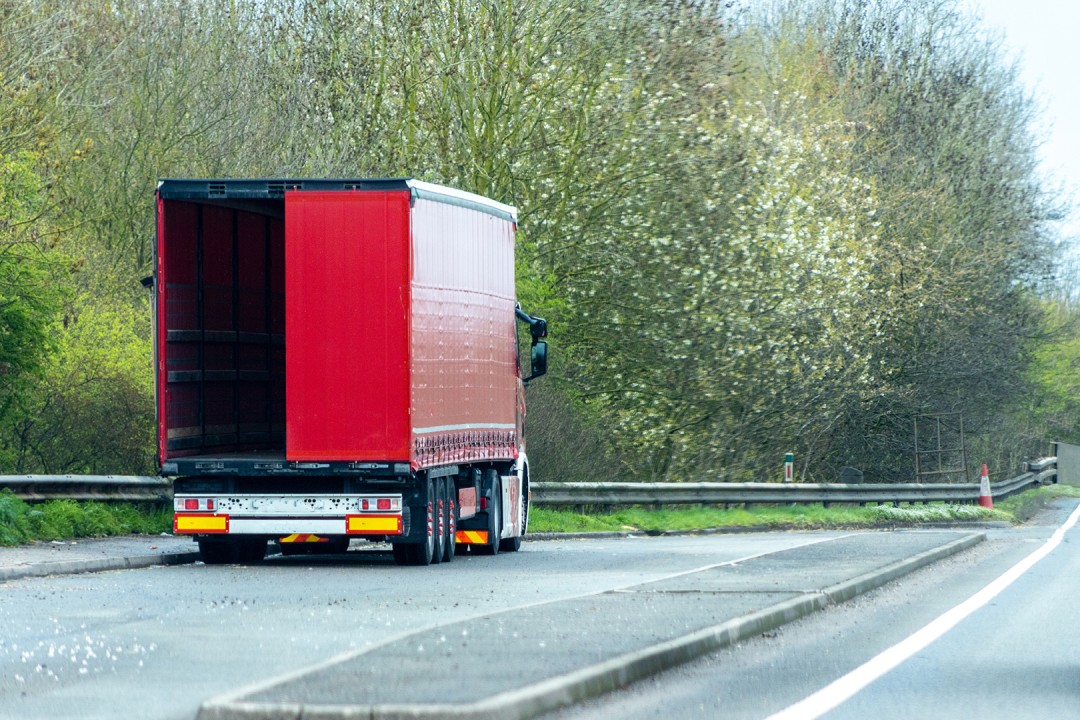
Susie Jones
Kiezen bestuurders aanlegplaatsen boven tankstations
Gemaakt: 19-08-2024
•
Bijgewerkt: 19-08-2024
In 2022 waren er in het Verenigd Koninkrijk meer dan 5.000 meldingen van vrachtcriminaliteit - wat neerkomt op een verlies van ongeveer 66 miljoen pond. De toename van vrachtcriminaliteit vormt een ernstige bedreiging voor toeleveringsketens, bedrijven en consumenten - en baart de transportsector grote zorgen.
Volgens een rapport van de politie van Cambridgeshire vond 46% van alle ladingdiefstallen plaats op straten en in parkeerhavens, en 27% bij benzinestations. Desondanks blijkt uit sociale gesprekken dat veel chauffeurs om verschillende redenen in uitwijkhavens blijven parkeren.
De problemen met parkeren op een uitwijkhaven
Voor bestuurders is 's nachts parkeren op een parkeerplaats vaak de eenvoudigste en voordeligste optie. Het heeft echter een aantal nadelen die een negatieve invloed kunnen hebben op de mentale gezondheid en veiligheid van de bestuurder.
Faciliteiten - Chauffeurs hebben meer faciliteiten nodig, zoals toiletten, douches en eten. Een gebrek aan schone faciliteiten kan het ongemak vergroten en een negatieve invloed hebben op de slaap, concentratie en mentale gezondheid.
Veiligheid van de bestuurder - Parkeren in uitwijkhavens vormt een extra risico voor de veiligheid van de bestuurder. Uit een onderzoek van de AA bleek dat tweederde van de dodelijke ongevallen met stilstaande voertuigen op een tweebaansweg plaatsvonden in uitwijkhavens - meer dan de helft van de geraakte voertuigen waren vrachtwagens.
Ladingdiefstal - De sector kende een stijging van 380% in ladingdiefstal van juni-juli in 2023, wat de behoefte aan veilig en beveiligd parkeren benadrukt. Met opportunistische dieven die hun pijlen richten op parkeerterreinen, lopen chauffeurs het risico hun lading te verliezen en wagenparken miljoenen ponden.
Waarom chauffeurs in uitwijkhavens parkeren
Ondanks de risico's suggereerde social listening via Facebook dat 70% van de chauffeurs om verschillende redenen minder geneigd was om een vrachtwagenparkeerplaats te verkiezen boven een parkeerplaats:
Beveiliging
Feedback van sociale media suggereerde dat 43% van de vrachtwagenchauffeurs ervoor koos om niet te parkeren bij een truckstop of tankstation vanwege het gebrek aan veiligheidsmaatregelen.
"Ik parkeer alleen in uitwijkhavens of op industrieterreinen. Als ik bij diensten/vrachtwagenstops heb geparkeerd, zijn mijn gordijnen doorgeknipt", zegt vrachtwagenchauffeur Luke.
De veiligheid en beveiliging van truckstops in het Verenigd Koninkrijk is een veelbesproken onderwerp binnen de transportsector - chauffeurs vragen de overheid om meer steun voor extra beveiligingsinstallaties. Uit eerdere feedback bleek dat chauffeurs graag zouden zien dat de [HGV levy] (https://motortransport.co.uk/industry-news/drivers-want-hgv-levy-funds-spent-on-truck-stops/17658.article) wordt geïnvesteerd in veiligere, hygiënischere en betaalbare parkeerplaatsen.
Uit sociale media bleek dat 59% van de vrachtwagenchauffeurs aangaf dat er in het Verenigd Koninkrijk onvoldoende veilige en beveiligde stopplaatsen zijn in vergelijking met Europa. Een mening die wordt ondersteund door feedback van [SNAP's Truck Park Tour] (https://snapacc.com/truckpark-tour-2023/), waar 31% van de Europese chauffeurs aangaf het meest te profiteren van de toegang tot exclusieve, beveiligde SNAP-locaties. Beveiligingsorganisatie TAPA wordt algemeen erkend in Europa - veel locaties zijn gecertificeerd op niveau 1, 2 of 3.
Daarentegen zijn er in het Verenigd Koninkrijk slechts twee locaties met een TAPA-certificering - met door SNAP PSR opgeleide geautoriseerde controleurs van niveau 3 die de locaties accrediteren. Formula Services en The Red Lion hebben beide een certificering van niveau 3. Bij The Red Lion is één overtreding gerapporteerd en bij Formula Services geen, ondanks de locatie in een gebied met veel criminaliteit.
Markus Prinz, Senior Manager of Standards, Training, and Certification bij TAPA, legt uit: "Wij staan volledig achter alle activiteiten om een efficiënte en veilige parkeerinfrastructuur voor vrachtwagens te garanderen en de veiligheid voor vrachtwagenchauffeurs, voertuigen en vracht te verbeteren. Door een open ecosysteem te bieden voor de technische en economische optimalisatie van veilig parkeren voor vrachtwagens, geloven we dat de overgang naar veilig parkeren voor vrachtwagens kan worden gestimuleerd."
Terughoudendheid van het bedrijf
30% van de chauffeurs gaf aan dat hun wagenparkbedrijven niet bereid waren om te betalen voor truckstops of servicestations. Een chauffeur legde uit:
"Minder bedrijven betalen helaas voor parkeren 's nachts, voorzieningen blijven op het nippertje open, snijden in hun personeelsbestand om de rekeningen te kunnen betalen en er komt minder parkeergeld binnen."
Truck stopt op maximale capaciteit
"Je kunt zien welke haltes beveiliging hebben, want om 18.00 uur zijn ze vol."
70% van de chauffeurs gaf aan gefrustreerd te zijn over het feit dat beveiligde stopplaatsen op hun maximumcapaciteit zitten, waardoor ze geen andere keuze hebben dan op een parkeerplaats te parkeren. Feedback van de Truck Park Tour gaf een vergelijkbaar gevoel - velen uitten hun bezorgdheid over Britse locaties die vol waren voordat ze aankwamen.
Uit gegevens van het TfL's 2022 onderzoek naar vrachtwagenparkeerplaatsen blijkt dat ondanks een toename van 12% in de on-site capaciteit van 2017-2022, dit niet genoeg is om de toename van 21% voertuigen in dezelfde periode te ondersteunen.

Verminderen van parkeren 's nachts in uitwijkhavens
Overheidsfinanciering
18% van de chauffeurs wilde meer financiering van de overheid om beveiligingsinstallaties te ondersteunen. In september 2023 kende het Department for Transport [£8 miljoen toe aan 39 wegkantfaciliteiten] (https://www.gov.uk/government/news/better-facilities-for-lorry-drivers-as-winners-of-8-million-funding-revealed) in heel Engeland om faciliteiten en beveiliging te verbeteren. Het Access & Security-team van SNAP begint de bedrijven die financiering hebben gekregen te ondersteunen door hun verbeteringen door te voeren. Verdere financiering tot £100 miljoen is beschikbaar tot 2025 onder het match-funding programma van de overheid.
Beveiligingsinstallaties
Om vrachtwagenchauffeurs een veilige omgeving te bieden, kunnen truckstops investeren in robuuste beveiligingsinstallaties - producten zoals CCTV, ANPR, intercom, slagbomen en kiosken versterken de veiligheid op het terrein en schrikken criminele activiteiten af. SNAP Access & Security combineert op maat gemaakte beveiligingsproducten en marktexpertise om de mensen, voertuigen en inhoud van truckstops te beschermen.
Mogen vrachtwagenchauffeurs in het Verenigd Koninkrijk aan de kant van de weg slapen?
Sinds 1 november 2017 heeft de DVSA nieuwe regels en voorschriften ingevoerd met betrekking tot chauffeurs die rusten op locaties zoals woonwijken en uitwijkhavens. Chauffeurs kunnen een boete krijgen tot £300 als ze hun pauze doorbrengen op een uitwijkhaven of aan de kant van de weg.
Hoe blijven vrachtwagenchauffeurs wakker tijdens het rijden?
Vrachtwagenchauffeurs moeten zich aan de tachograaf regels houden om hun veiligheid en die van alle anderen op de weg te garanderen. Het doel van een tachograaf is om vermoeidheid bij chauffeurs te voorkomen en ervoor te zorgen dat chauffeurs en werkgevers zich aan de regels houden.
Desondanks is het voorkomen van verveling en vermoeidheid onderweg voor veel chauffeurs een uitdaging en kan het hun welzijn beïnvloeden. De meeste chauffeurs luisteren het liefst naar muziek en podcasts terwijl ze onderweg zijn en houden van sociale interactie met andere chauffeurs bij truckstops en tankstations.
Mogen vrachtwagenchauffeurs passagiers meenemen in het Verenigd Koninkrijk?
De gemiddelde vrachtwagenchauffeur zit ongeveer 12 uur per dag achter het stuur. Om eenzaamheid en verveling tegen te gaan, mogen chauffeurs passagiers meenemen als ze zich houden aan de specifieke regels van het FMSCA. Chauffeurs moeten schriftelijke toestemming krijgen van hun bedrijf door een passagiersaanvraag in te dienen - in deze aanvraag moeten de duur van de reis en de data worden vermeld.
De algemene vereisten zijn als volgt: - Passagiers mogen niet zwanger zijn
Ze mogen niet lijden aan ernstige of chronische gezondheidsproblemen
Ze moeten tien jaar of ouder zijn
Een ziektekostenverzekering is verplicht.


